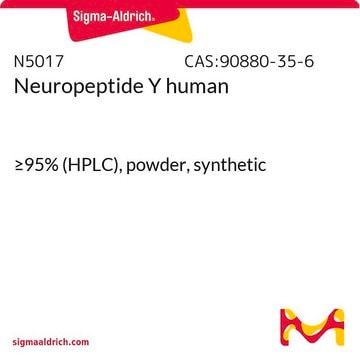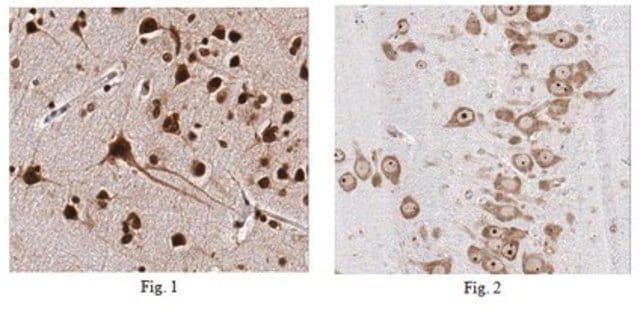詳細
Anti-Neuropeptide Y (NPY) is developed in rabbits using synthetic neuropeptide Y (porcine) conjugated to keyhole limpet hemocyanin (KLH) as the immunogen.
Neuropeptide Y (NPY), a 36-amino acid peptide amide, is a major regulatory neuropeptide widely distributed in the mammalian central (CNS) and peripheral nervous systems (PNS). NPY belongs to the pancreatic polypeptide family of peptides which are characterized by a common tertiary structure. Within this family, an intestinal peptide hormone, peptide YY (PYY), is most closely related to NPY. In the CNS, NPY is involved in regulation of blood pressure, memory processing, circadian rhythm, and stimulation of food intake. In the PNS, NPY has potent vasoconstrictor activity and acts as a neurotransmitter/neuromodulator of sympathetic neurons and adrenal glands. NPY is one of the most abundant peptides found in the CNS, widely distributed in the brain. High levels of NPY are present in the cerebral cortex, amygdaloid nuclei, hippocampal formation, and hypothalamus. In the PNS, NPY is found mainly in sympathetic neurons that innervate vascular smooth muscle, heart, and urogenital tract. The biological actions of NPY in the brain and periphery are mediated by at least two different NPY receptors, designated Y1 and Y2 receptor subtypes.
特異性
The antibody recognizes by ELISA, NPY (human), NPY (porcine), NPY (sheep), NPY (13-36), NPY (18-36), and cross-reacts with PYY (human). It does not cross-react with neurokinin B (NKB), neurokinin A (NKA), substance P (SP), calcitonin, somatostatin and BSA.
アプリケーション
Anti-Neuropeptide Y (NPY) antibody produced in rabbit has been used in:
- single-labeling immunocytochemistry
- immunofluorescence
- immunostaining
- dot blot
- radioimmunoassay (RIA)
- enzyme-linked immunosorbent assay (ELISA)
生物化学的/生理学的作用
Neuropeptide Y (NPY) plays a vital role in feeding behaviour, anxiety, epilepsy, circadian, rhythm memory processing, sleep, pain and drug addiction. In addition, it is also implicated in regulation of appetite, body weight and obesity. It controls central endocrine secretion and has potent vasoactive effects on the cardiovascular system. NPY is involved in the pathogenesis of atherosclerosis and coronary artery disease.
免責事項
Unless otherwise stated in our catalog or other company documentation accompanying the product(s), our products are intended for research use only and are not to be used for any other purpose, which includes but is not limited to, unauthorized commercial uses, in vitro diagnostic uses, ex vivo or in vivo therapeutic uses or any type of consumption or application to humans or animals.








